This is an old article of mine that was published on Culturewatch (which later became the Film & Bible Blog from Damaris) in 2007. I am gradually republishing many of my Culturewatch articles here, especially since the demise of Damaris Trust and its websites. What's prompted me to republish this article on Amazing Grace today is that I'm teaching on Bible & Culture this week, and we had a film discussion on it yesterday evening.
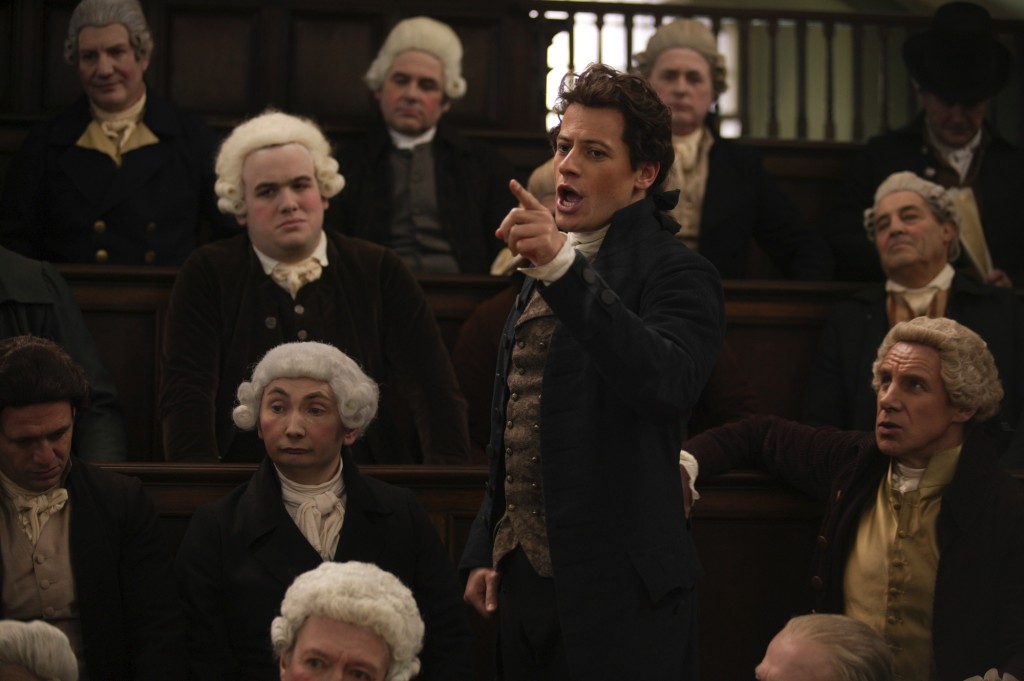
William Wilberforce is one of the world’s great heroes: statesman, reformer, philanthropist, evangelical Christian. It has been said that Victorian Britain was largely his creation. He was concerned about mistreatment of animals (a founder member of the Society for the Prevention of Cruelty to Animals, soon to receive Royal status to become the RSPCA), education, the social impact of heavy gin drinking, and the need for missionaries in various parts of the world, including India and Africa (he was a founder of the Church Missionary Society and the British and Foreign Bible Society).
He is most famous, of course, for his enormous efforts to bring about the end of the slave trade, and then to abolish slavery itself. Wilberforce was far from being the only campaigner against the slave trade in the early nineteenth century, but as 2007 is the bicentenary of the abolition of the slave trade, he is the figure on whom much attention is currently focused. He was the MP who doggedly presented his bill to Parliament year after year, the one around whom many of the campaigners rallied.
Amazing Grace is the story of his struggle. It opens with Wilberforce (Ioan Gruffudd) being taken to the home of his cousin Henry Thornton (Nicholas Farrell) to be cared for. William’s health and his will to keep on fighting have broken after fifteen years of campaigning. Henry, a doctor, administers laudanum (opium dissolved in alcohol) to combat Williams pain, and he and his wife seem to be intent on keeping Wilberforce away from politics and getting him settled down with a wife. The story of how Wilberforce reached this point is told in long flashbacks, partly as he tells his story to the idealistic young woman, Barbara Spooner (Romala Garai), whom Henry and his wife are attempting to set William up with.
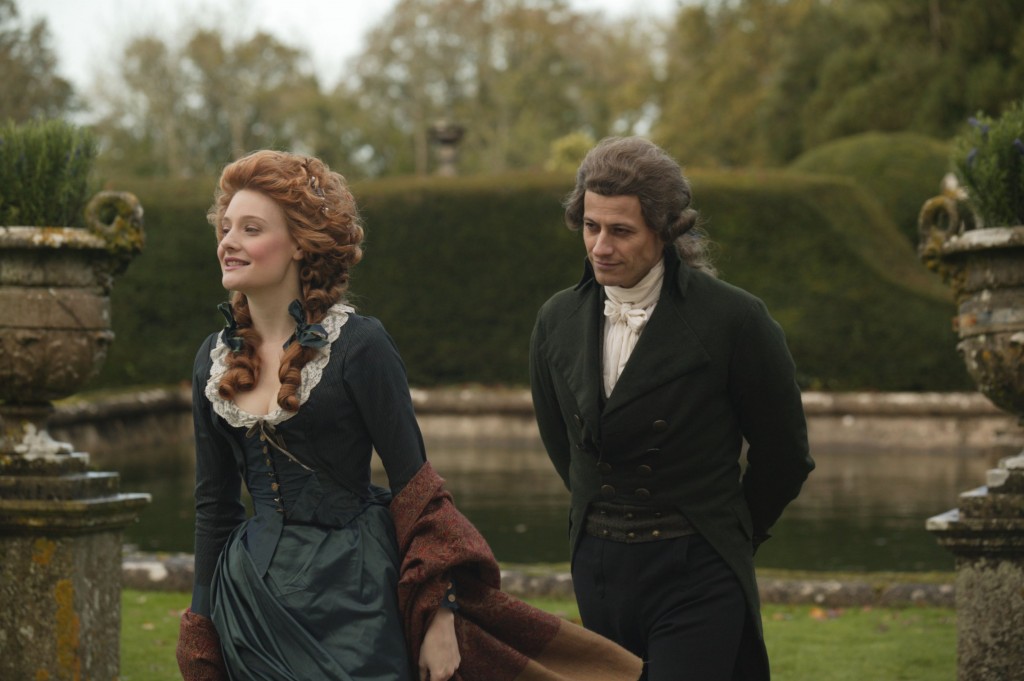
Amazing Grace is a wonderful film in many respects. It is powerful, moving and inspirational. Michael Apted’s direction and Steven Knight’s screenplay are both very good, though they leave out or diminish some of the many aspects of Wilberforce’s rich life. Admittedly, they are telling the story of just one facet of that life, and they can do little other than nod in the direction of some of the others.
Nevertheless, Apted keeps us focused on the issue of slavery and he conveys its horror without assailing viewers with endless scenes of slaves being mistreated. It is our awareness of the reality behind the story that makes it so disturbing at times: slavery was a terrible evil and it almost defies belief that it took so long for enough of Wilberforce’s political contemporaries to realise the fact. What helps to drive home the reality of it all is the exceptional performances from all the actors as their characters reflect on how the slaves are treated. Ioan Gruffudd is excellent as Wilberforce, bringing passion, energy, seriousness and charm to the role, though Albert Finney as John Newton deserves particular praise.
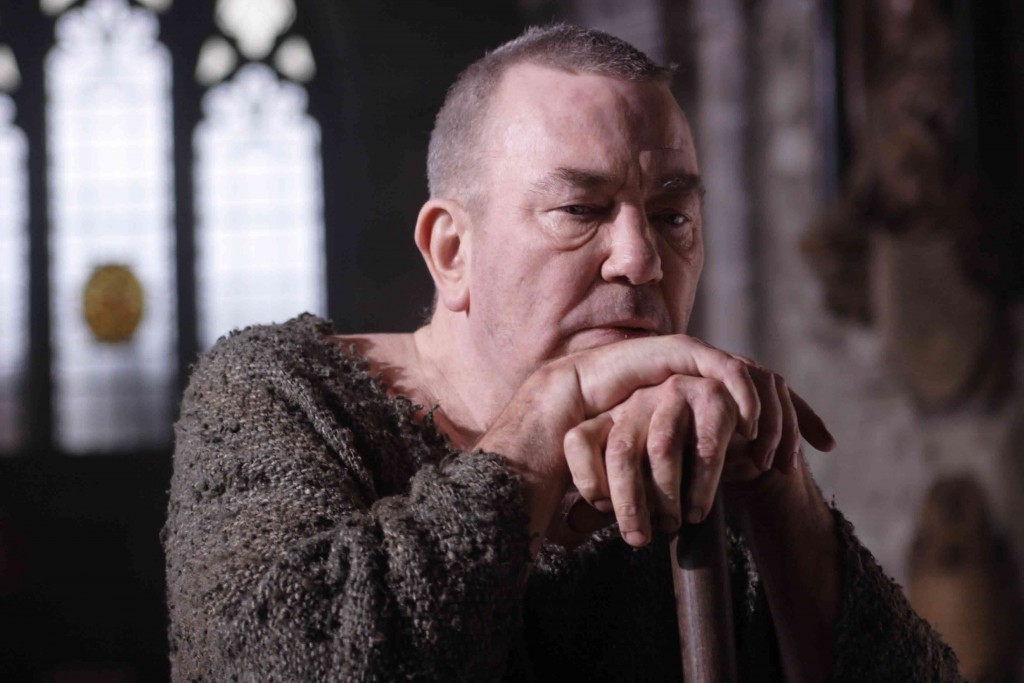
At first, Wilberforce wrestles with others’ expectations of him. He has recently been converted and contemplates leaving politics for a life of devotion to God. Others, including his good friend William Pitt (Benedict Cumberbatch), are of the opinion that he would be wasting his considerable gifts. Pitt asks him, ‘Do you intend to use your beautiful voice to praise the Lord or change the world?’ He asks this question after bringing a curious group of people to dinner at Wilberforce’s house. As Wilberforce questions them to discover why Pitt has invited them, he discovers that they are all anti-slavery campaigners. They include Thomas Clarkson (Rufus Sewell), Hannah More (Georgie Glen), James Stephen (Stephen Campbell Moore) – all members of the group of evangelical Christian reformers now known as the Clapham Sect – and Olaudah Equiano (Youssou N'Dour), a former slave.
When Wilberforce asks Hannah More about the matters which she and her friends at Clapham discuss, she replies, ‘Issues regarding the making of a better world.’ Wilberforce inquires further: ‘Better in which way?’ to which one of the other guests remarks, ‘You make the world better in one way, it becomes better in every way, don’t you think?’ At this point Wilberforce turns to Equiano and soon discovers that he has come to London to challenge the MP about the issue of slavery. Clarkson clears a space on the table and deposits a set of manacles, explaining their use to his surprised host, and Equiano opens his shirt to show his branding mark. ‘Mr Wilberforce, we understand you are having problems deciding whether to do the work of God or the work of a political activist,’ says Clarkson. ‘We humbly suggest you can do both,’ adds Hannah More.
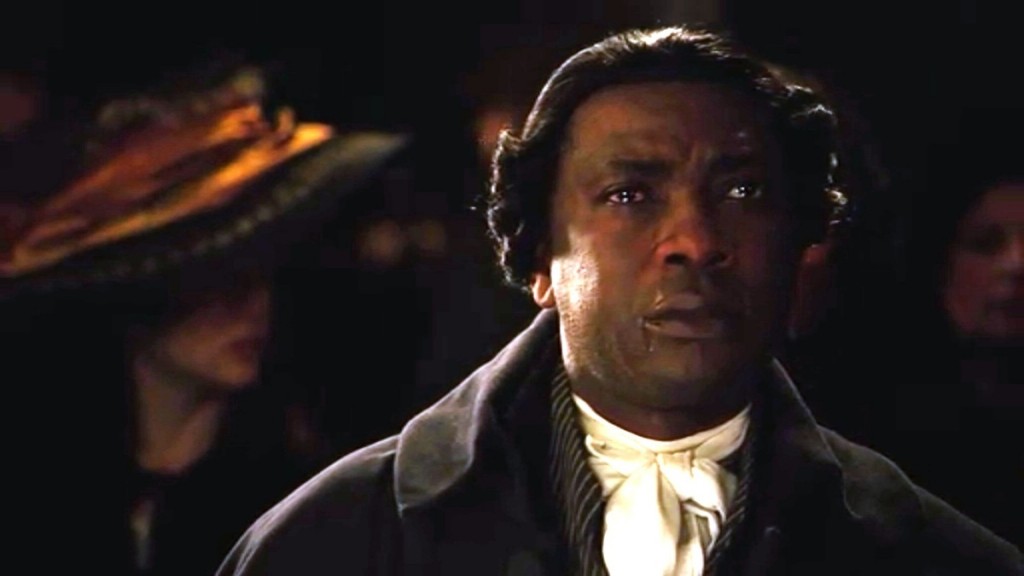
As a result, Wilberforce throws himself into leading the parliamentary campaign, gaining some formidable enemies in the process, not least the Duke of Clarence (Toby Jones) and Lord Tarleton (Ciarán Hinds), MP for Liverpool. The bill which he presents is defeated again and again, despite the tide of public opinion turning against the slave trade. Eventually, it grinds Wilberforce down, and he feels utterly defeated as he tells his story to Barbara. However, she inspires William both to fall in love and to go on again with the struggle.
Wilberforce visits his old preacher John Newton, the former slave trader turned Anglican vicar. Newton, old, blind and dressed in sackcloth because of his remorse over the deaths of twenty thousand slaves on his ships, is dictating his memoirs when Wilberforce arrives. Newton tells him, ‘This is my confession. Names, ships’ records, ports, people; everything I remember is in here. Although my memory’s fading I remember two things very clearly: I’m a great sinner and Christ is a great saviour.’ It is this conviction which has transformed Newton’s life and which drives William Wilberforce, along with the biblical understanding that every human being is made in God’s image.
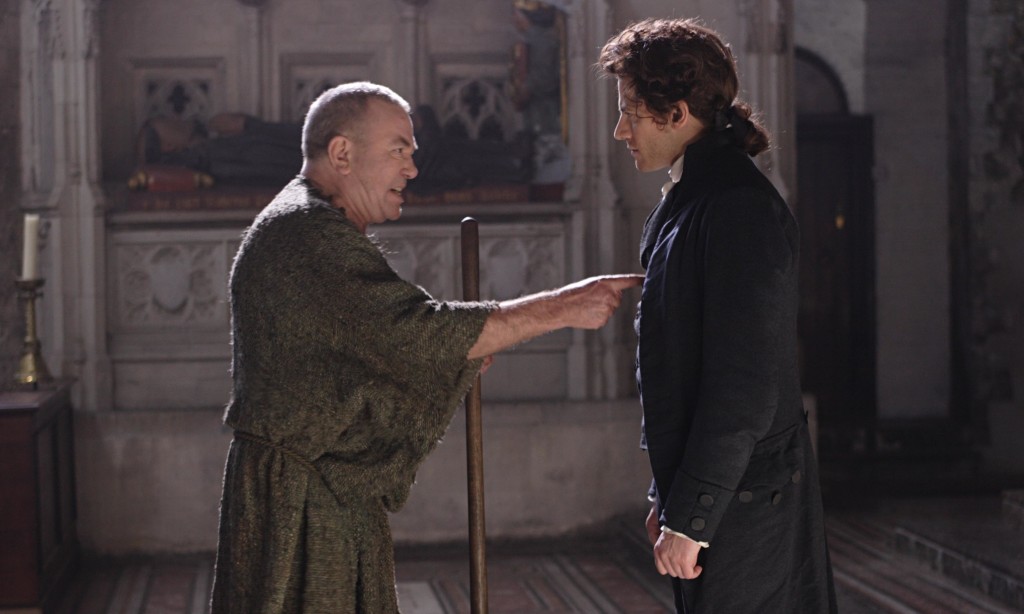
At one point Wilberforce stands on the poop deck of a slave ship and addresses the gentry assembled on the deck of another ship which pulls alongside:
Ladies and Gentlemen, this is a slave ship, the Madagascar. It has just returned from the Indies where it delivered two hundred men, women and children to Jamaica. When it left Africa there were six hundred on board. The rest died of disease or despair. That smell is the smell of death – slow, painful death. Breathe it in; breathe it deeply. Take those handkerchiefs away from your noses. There now – remember that smell. Remember the Madagascar. Remember that God made men equal.
Wilberforce’s victory was a wonderful turning point in history. At the very end of the film, Lord Charles Fox (Michael Gambon) declares:
When people speak of great men, they think of men like Napoleon – men of violence. Rarely do they think of peaceful men. But contrast the reception they will receive when they return home from their battles. Napoleon will arrive in pomp and in power, a man who’s achieved the very summit of earthly ambition. And yet his dreams will be haunted by the oppressions of war. William Wilberforce, however, will return to his family, lay his head on his pillow and remember: the slave trade is no more.
The relevance of this film for our own age can hardly be overstated. The legal slave trade may have been abolished two centuries ago, but a secret trade continues nevertheless. Human traffickers smuggl people across many borders to be slaves, often in the sex industry, even into our own country. It is estimated that 27 million men, women and children around the world today are slaves – forced to work long days in plantations and factories, or compelled to fight in rebel armies, or as sex slaves. These people are not free, they have no choices in life, the money they make goes into others’ pockets, and they are frequently the victims of abuse and violence. The world still needs changing; it still needs people like Wilberforce who, driven by their convictions in the value of human life and in God’s concern for our broken world, will not rest until society has been transformed.
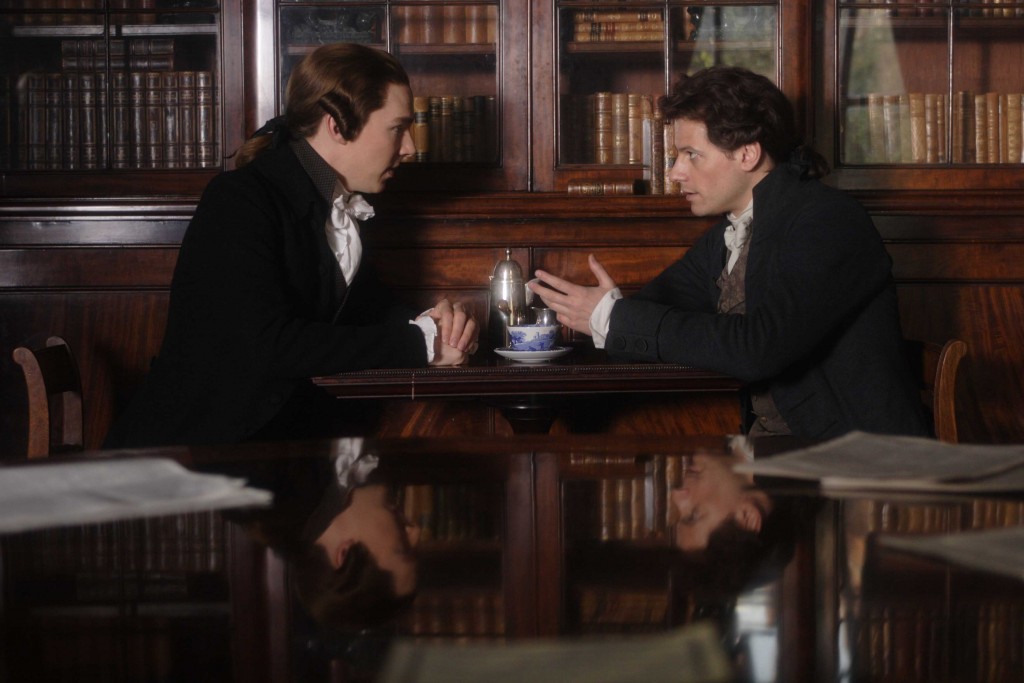
William Wilberforce was a very gifted statesman, a social reformer, a philanthropist and an evangelical Christian. As well as working to bring about the end of the slave trade, and then to abolish slavery itself, he was concerned about mistreatment of animals (he was a founder member of the Society for the Prevention of Cruelty to Animals, later to become the RSPCA), education, the social impact of heavy gin drinking, and the need for missionaries in various parts of the world, including India and Africa (he was a founder of the Church Missionary Society and the British and Foreign Bible Society). Screenwriter Steven Knight’s research into Wilberforce showed him to be
‘a single-minded man who kept pursuing his goal, and plucked success from the jaws of defeat. To most people at the time the idea of abolishing the slave trade was ludicrous – like someone today suggesting that we abandon the internal combustion engine right now! At the same time he was an eccentric. He had a house full of sick animals, and could never bring himself to fire any of his staff, so that by the time he was fifty, he had a house full of old servants, most of whom did nothing. And he would come home to find his house full of people he didn’t know, sleeping there.’
Wilberforce was born in Hull in 1759, the son of a wealthy merchant. He studied at Cambridge University from 1776 where he became good friends with William Pitt, later to become Prime Minister. He became a Member of Parliament for Kingston-upon-Hull in 1780, and then for Yorkshire in 1784. Wilberforce became an evangelical Christian and a leading member of the Clapham Sect, a prominent group of Christian reformers. Influenced by other members of the group, particularly the abolitionist clergyman Thomas Clarkson, he campaigned for eighteen years until the Slave Trade Act was passed on 25 March 1807. Director Michael Apted says, ‘He had a very strong moral drive, based on his religious beliefs, but Wilberforce moved in the real world and could form alliances with people he didn’t totally approve of, in order to get closer to his goal. He proved that although he was driven by a divine purpose to rid the world of this iniquitous slave trade, to execute this mission he needed to be strong, worldly, smart and political. A combination of Christian visionary and skilled politician, his overwhelming tenacity eventually let him reach his goal.’
While few people these days know much about the members and work of the Clapham Sect, even less are aware of Oloudah Equiano. Equiano was a Nigerian slave who managed to buy his freedom and get to London where he campaigned against slavery and wrote a best-selling book about his experiences. Apted comments, ‘The role of Equiano is crucial and complicated in the film. Youssou had that pure presence; he brings a richness and dignity to his scenes.’
For more information see:
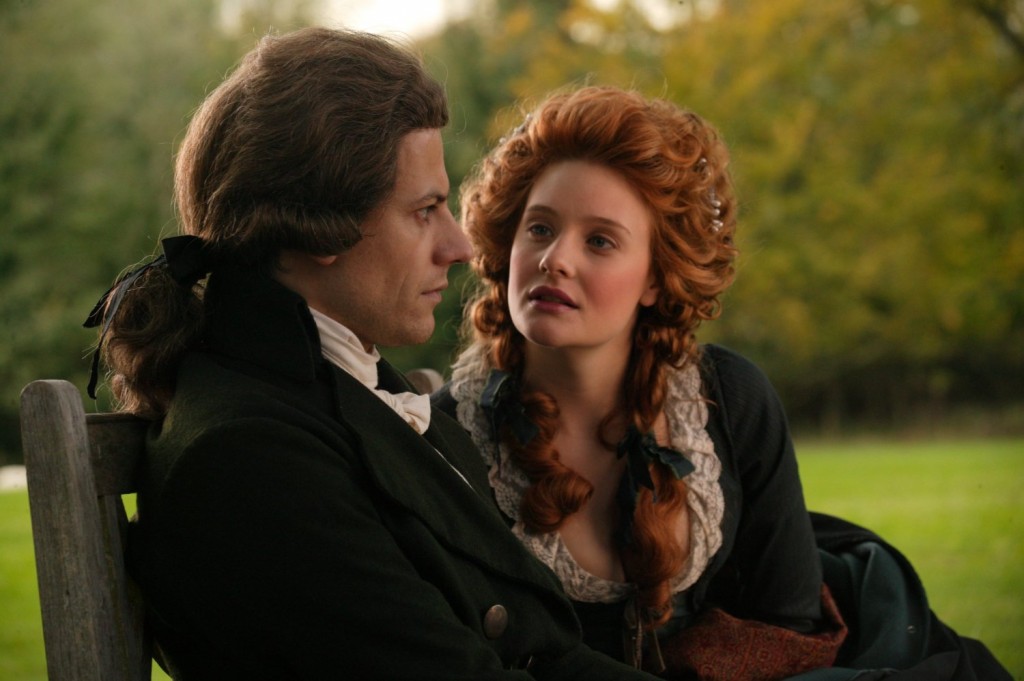
'Thomas Clarkson, though he was a passionate man, was also a very pious and serious individual. He was almost a Quaker’ and stayed with Quakers when travelling around the country. . . . Rufus Sewell’s portrayal of Clarkson in the film is seriously misguided.' (Maureen James, The Clarksons Society)
How do you feel about Clarkson's character being misrepresented in the film? To what extent does it matter whether he was 'very pious' or 'not necessarily all totally clean-cut and wholesome'?
Do you think this is what Amazing Grace does show? Do you agree with Gruffudd? Why/why not?
Has watching Amazing Grace changed you in any ways? If so, how? Has it motivated you to get involved in the Stop the Traffick or other campaigns to deal with human trafficking and slavery?